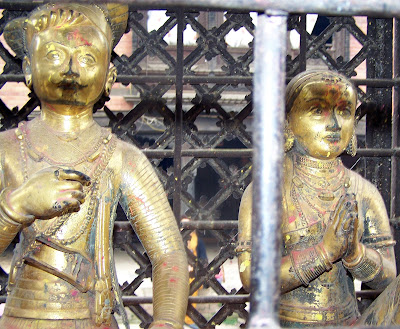Monday, September 10, 2012
Changu Narayan Temple
Tags : Changu Narayan Temple, Featured
Changu Narayan Temple
Changu Narayan temple is situated at
Bhaktapur, 18 kilometers east of Kathmandu in a hilly terrain at 1541 meters above
the sea level. This temple is significant from religious, cultural, historic archaeological
viewpoints. The temple stands on a foundation of a single stone.
 |
| Two storied Changu Narayan pagoda style temple. |
Changu Narayan temple is decorated with artistic
woodcarving and stone sculptures representing different gods and goddesses. A
pagoda style temple is one of the oldest one dating back to 14th century AD. The
temple was built by King Hari Dutta Varma in 322 AD. This falls into one of the seven world heritage
categories of the Kathmandu valley, Changu Narayan Temple also is on the UNESCO’s
World’s Heritage list.
This is a fantastic center for the
woodcarving and stone - works lovers. The unique and beautiful stone and wood
works are seen in each and every corner in and around the temples premises. The
woods and stones art works the constitute pride and culture of Lichhavi
period.
 |
A Brief History:-
According to a legend, Lord Vishnu, while fighting
with the demon king named Changu, killed a Brahmin named Sumati. Guru
Sukracharya, the preceptor of the dead Brahmin was angry with Vishnu and cursed
him that he will be beheaded by a Brahmin in the future. After this incident, Lord Vishnu lived in
Champak (Micheli a Campaca) forest. A Brahmin named Sudarshan lived in a
village, near the forest. The Brahmin
had a cow and his cowherd brought him the milk in a bucket, the story further
says that the Brahmin could notice the diminished amount of milk being brought
to him by his cowherd. When asked the reason for that cowherd told him that the
bucket lost half of milk while passing through the Champak Village. To solve
the mystery, the angry Brahmin cut the Champak tree and beheaded Lord Vishnu,
while he was coming out of the tree.
The temple of Changu Narayan remains a
milestone in Nepalese temple architecture. It is one of the best specimens of
multi roofed style architecture of Nepal, with rich embossed works. This two storied
roof temple stands on a high plinth of bricks and stone. The four entrances to
this temple are guarded by life size pairs of animals such as elephants, lions,
griffins on either side of the entrance. Within
myth lions creatures like lions ,a combination of man, bird and beast
which icons are carved within the wooden bracket in the corner supporting
the horizontal beams which support the
roof.
 |
Stone sculptures of Lord Bishnu and other gods
and goddess.
|
 |
| Lord Bishnu with his spouse goddess Laxmi aside on Garud. |
 |
| Stone sculptures of Baman avatar of Lord
Vishnu. |
 |
A Sankha (konch)
placed at the right side of the main
gate of the temple.
|
 |
| A Chakra (divine wheel) weapon of lord Bishnu placed at the feft side of the temple. |
 |
| A general view of the main entrance of the temple |
The temple is encircled by gods and goddess craned
in the unique and beautiful stones images.
(Sources Changu Narayan Village Development Committee (CNVDC) brochure guide book)
Brief descriptions are as follows:-
One of the proud collections of Changu Narayan
complex is the installation of a human faced bird, a Garud on Vishnu, with its
knee in a posture of genuflection and (Namaste) folded both palms and it is
donated by the king Manadev in the year 464 AD. He is a mount and a great
devotee of Vishnu.
 |
| Stone image of human face bird Garud. |
King Bhupatendra Malla and Queen Bhuban Laxmi
are placed the next to the Garud statue. South West of the shrine,a temple is
dedicated to Chinnamasta of the Shakti cult and was constructed, during 17th
century AD. According to Hindu mythology, Goddess Parvati offered her own head
to feed her hungry companies and it became famous as Chinnamasta.
 |
Image of King Bhupatendra Malla along with Queen
Bhuban Laxmi.
|
 |
A Art of
Chhinnamasta (source - NTB Book)
|
The one magnificent work is that of the
sculpture of Tribikram, the one her head cut off a Vishnu of 8th century
AD. This sculpture depicts the scene of
the popular Hindu myth of lord Vishnu and his devotee king Bali. The lower
panel of the statue is depicted in the poses of bestowment by Bali bowing to
Vishnu. There aren’t many icons of soft Tribikram Vishnu exist in the Kathmandu
valley.
The icon of Narshimha is an outstanding work
of the 10th century. The theme of the icon is to abolish sins from the face of
the earth. God Vishnu incarnated as a form of half man and half lion creature
in order to kill the demon King Hiranyakashyapu without using any weapon or arms
but by the scratch of nails.
 |
| Stone sculptures of God Narasimha avatar (encarnation of half mand and half lion image of lord Bishnu). |
A piece of rice particles (Kanika) is placed
in the temple in the main entrance of temple for the urgency period of drought.
It dates back to some ancient period.
 |
A particle of rice
(kanika) placed at the temple for the time of emergency during drought.
|
The two storied pagoda style temple of
Kilewshor Mahadev was sanctum in the 17th century AD. The temple is famous for
its erotic motifs. Forming the lower part of struts. The four faced Shivaling
has been placed in the main built.
Text and Pictures by - Devendra Singh.
For Further Reading,
Changu Narayan Temple,
Featured












